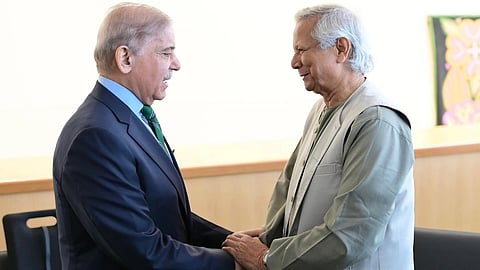
- Home
- Live Blog
- Breaking News
- Top Headlines
- Cities
- NE News
- Sentinel Media
- Sports
- Education
- Jobs

Dhaka: Muhammad Yunus, head of the interim government in Bangladesh, is making desperate attempts to revive the South Asian Association for Regional Cooperation (SAARC) - a regional grouping which has remained stagnant for over one decade due to Pakistan’s promotion of cross-border terrorism and its persistent obstruction of several development initiatives.
During his ongoing visit to New York for the United Nations General Assembly, Yunus raised the issue of stalled SAARC summits since the 2014 edition in Kathmandu. Only a few weeks ago, Yunus had spoken about renewing and reviving the SAARC during his discussion with the visiting Deputy Prime Minister and Foreign Minister of Pakistan, Ishaq Dar in Dhaka on August 24.
In the absence of democracy, the rickety and illegitimate interim administration in Bangladesh is working hard to divert public attention by talking Pakistan’s language of revival of SAARC.
SAARC was founded in Dhaka on December 8, 1985 with the noble aim of fostering economic and social development, cultural exchange and regional stability among eight South Asian member nations of Afghanistan, Bangladesh, Bhutan, India, Maldives, Nepal, Pakistan, and Sri Lanka.
New Delhi strongly hoped for the SAARC to take a lead in the region, but Pakistan’s continuous sponsoring of terrorism made the organisation completely incapable and incompetent. India maintains that SAARC remains a non-starter because of Pakistan.
Pakistan’s anti-India activities always obstructed the forward movement of SAARC. Even now, Rawalpindi continues to promote terror activities in the region.
In 2016, with the stagnation of SAARC following the Uri terror attack began the rise of Bay of Bengal Initiative for Multi-Sectoral Technical and Economic Cooperation (BIMSTEC).
Established on June 6, 1997 the regional organisation united seven member countries in South and Southeast Asia, including Bangladesh, Bhutan, India, Nepal, and Sri Lanka from South Asia and Myanmar and Thailand from Southeast Asia. It connects the two regions, focuses on economic and technical cooperation among its members and offers ways to foster regional cooperation by Outmanoeuvering complications posed by Pakistan.
In India’s strategic and foreign policy calculus, BIMSTEC focuses on enhanced connectivity, economic integration, and human security. (IANS)
Also Read: Rise of anti-democratic, radical outfits wreaks havoc on Bangladesh’s minorities: Muhammad Yunus
Also Watch: